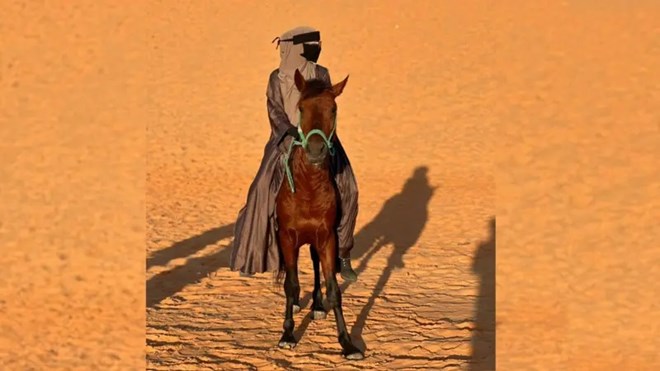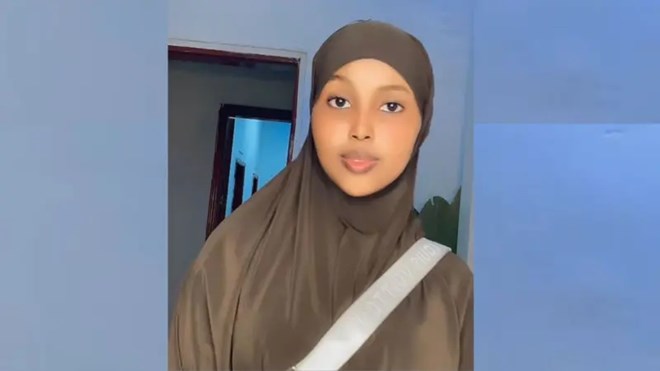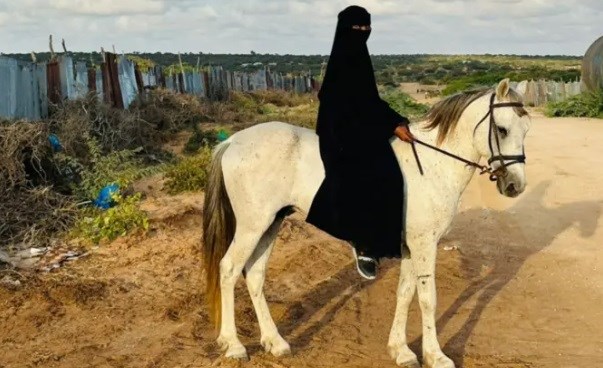
Thursday October 31, 2024

Shukri Osman Muse, clad in traditional attire, rides a horse across a sun-drenched terrain, showcasing her skill and dedication to breaking barriers in the male-dominated world of equestrian sports. Credit: Supplied by Shukri Osman
Mogadishu (HOL) — Shukri Osman Muse is making history in Mogadishu as the city's first female equestrian, challenging societal norms in a field long dominated by men. In just three months, she has navigated the challenges of training and competing in an environment with limited resources for women.
Raised in the Somali capital, Shukri grew up captivated by the idea of horse riding. Yet, her dream was stymied by the absence of dedicated facilities. "I've always loved horses, but I thought there were no places to learn in Mogadishu. I hadn't even seen a horse in real life," Shukri shared.
Her determination led to an exhaustive search for training, aided by friends and family who supported her in finding a place where she could learn. The breakthrough came when she connected with a local family who kept and trained horses, setting her on a path toward realizing her passion.
The day she first rode a horse was filled with anticipation and nerves. Her instructor walked her through safety techniques, positioning, and the importance of staying calm. Despite the advice, Shukri's excitement got the better of her. "On my first ride, I felt confident and decided to make the horse run. But I fell off," she said with a laugh. Fortunately, the soft, sandy ground spared her from injury.
Horse riding, Shukri learned, demands an acute awareness of the horse's condition and pace. The training follows a structured progression—beginning with mounting and stationary control, moving to a trot, and eventually mastering a gallop.
Shukri relies on her skill as a henna artist to fund her training. Her earnings go toward her lessons, supplemented by the encouragement of her family. This blend of personal effort and external support underscores her commitment to the sport.

Shukri Osman Muse, Mogadishu's pioneering female equestrian. Credit: Supplied by Shukri Osman
In Somali culture, horses hold significant value and are often distinguished by names reflecting their traits. "My favourite horse is called Waaweyne, and it has a striking mix of black and white. I'm also fond of black horses named Caynab," Shukri said. Other common horse names include Danab, Xamar, Ashkir, and Bullaale. Male horses are known as 'Sange' and females as 'Geenyo.'
As Mogadishu's only female equestrian, Shukri hopes to inspire other women to follow in her footsteps. Now confident enough to race and compete with male instructors, she dreams of someday owning her own horse. "I want a horse that I can call mine, one that I can care for and bathe regularly," she said, her eyes lighting up with hope.
Shukri Osman Muse's journey symbolizes resilience and the breaking of barriers. Her story reminds Mogadishu, and beyond that, determination and courage can open doors that once seemed sealed shut.

Shukri Osman Muse sits astride Waaweyne, her favorite horse, during a training session near Mogadishu. Her journey symbolizes courage and resilience as she challenges societal norms and inspires other women to pursue their dreams. Credit: Supplied by Shukri Osman
- With files from the BBC Somali Service